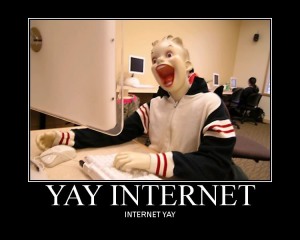There is nothing about the mixing of peer culture, personal interests, and education that require the following:
“Digital tools provide opportunities for producing and creating a wide variety of media, knowledge, and cultural content in experimental and active ways.”
“Social media and web-based communities provide unprecedented opportunities for cross-generational and cross-cultural learning and connection to unfold and thrive around common goals and interests.”
“Online platforms and digital tools can make learning resources abundant, accessible, and visible across all learner settings.”
– Mizuko Ito, et al. Connected Learning: An Agenda for Research and Design, p.74
They are certainly integral to the case studies that were presented: Massive Multi-Player Online Games, Screenwriting, Webcomics, Hip-Hop Production, programs at magnet schools in New York City, Minecraft, The Harry Potter Alliance, and afterschool programs backed by major research universities. Which is to say this: they are thoughtful and well-meaning, but still interventions which rely on the cultures and models of the dominant and elite in the United States, and with the exception of hip-hop, they tend to valorize silicon valley’s geek culture, and integrate it into a continually worsening economic system.
But “information” was never enough. Information is only intelligible given the proper knowledge, context, and opportunity. Likewise, knowledge is produced and shared within a complex infrastructure supported by a web of different agencies and organizations. Even if made cheap or free for consumers, that knowledge still requires other, more foundational knowledge, community affiliation, and economic freedom to convert into meaningful use.
Education, particularly the education of populations that most need it to improve their lot, is tied up with a political and economic situation that is not sufficiently addressed by merely connecting some of its output to the Internet, or by abdicating public responsibility to do otherwise to the first salesman who offers a sort-of viable alternative, no more than better night travel by car in Atlanta would be sufficiently supported by allowing private companies to connect to the electrical grid, or by providing government subsidies to flashlight manufacturers.
-Ian Bogost, Inequality in American Education will not be Solved Online
Although the examples provided by the Connected Learning group do provide plenty of knowledge, context, and opportunity, they largely reproduce their own subculture’s knowledge, context, and opportunities, and even the name “connected leaning” leans heavily enough on a computer network analogy that you can hear the cooling fans humming. Jocks and other non-geeks need not apply.


This really makes me think as I was explaining MOOCs today — it is a wonderful option to gain more knowledge, but as this post explores, it is still not open to everyone. Spoke with a patron tonight about the fate of libraries – yes, many have gadgets to read online, but the ones that do not are actually those that need libraries the most. I love progress, but it is a divider on so many levels. ~ a
so true. i feel like it’s the history of progress writ large: somebody gets left behind.
This is a pretty hefty misunderstanding of the programs cited. In almost all cases they serve an economically challenged population and in *all* cases the medium of participation/expression is driven by the participants choice– whether that be hip hop, painting, spoken word performance, or video. In fact, that is the driving force of the program, to allow the kids the opportunity to define their own paths of education. The technology isn’t important, the relationships between the youth and the mentors is. It just happens that when you become interested in a niche topic, it’s easier to build an affinity group by finding fellow enthusiasts online than it is to hope you’ll find them in your neighborhood.
More importantly, it’s a fundamental shift away from elite-driven, industrialized education into personalized, self-driven education.
they do, but i think the culture they present is pretty reflective of the funders. it’s not evil or wrong, but as a whole, it looks like the revenge of the nerds.
Excellent blog here! Also your website loads up fast!
What web host are you using? Can I get your affiliate link to your host?
I wish my web site loaded up as quickly as yours lol